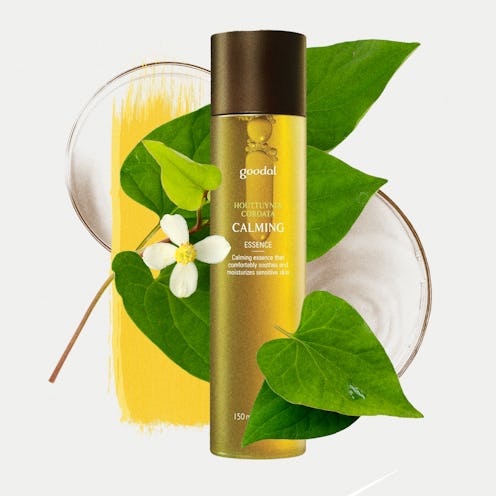(Back To Basics)
Sensitive Skin? This Popular K-Beauty Ingredient Will Soothe & Calm Your Complexion
Get to know the anti-inflammatory, antioxidant powerhouse.

With new products, brands, and categories popping up every day, beauty can be a bit overwhelming. Back to Basics is our rudimentary beauty series that serves as your crash course on the science behind some of the best formulations in the game. This week, we investigate heartleaf and how it benefits your skin.
The last decade has seen K-beauty take the world by storm — and it shows no sign of slowing down. Since its initial stateside debut back in 2011, Korean Beauty not only popularized the multi-step skin care routine but introduced Westerners to ingredients like snail mucin and propolis and products like facial essences and ampoules, to name a few. Now, there’s a new K-beauty ingredient trend on the horizon that’s sure to make its way to routines in no time: heartleaf, an anti-inflammatory powerhouse that’s a savior for sensitive, irritated skin.
Also known as houttuynia cordata and chameleon plant, heartleaf is a flowering plant native to Southeast Asia. Rich in plant-based compounds called polyphenolic flavonoids, it carries anti-inflammatory, anti-bacterial, and antioxidant properties. Due to these properties, heartleaf is commonly utilized in Asia for medicinal purposes via ingestion, extraction, and topical uses, explains board-certified cosmetic dermatologist Dr. Dendy Engelman.
“These [anti-inflammatory and humectant properties] make it a good ingredient for those with sensitive skin or certain skin conditions like eczema or dermatitis,” says Dr. Engelman, adding that its ability to fight inflammation aids in toning down acne and redness. As a humectant, heartleaf increases hydration by drawing in and trapping moisture within the skin, which she says helps maintain the skin’s natural moisture barrier to balance and soothe dryness and irritation.
According to cosmetic chemist and co-author of Skincare Decoded Gloria Lu, most of the studies on heartleaf have been performed in vitro (meaning it’s tested on cell cultures and not on actual skin), but there’s still some interesting data to back its anti-inflammatory properties. “Based on in-vitro studies so far, it’s believed that heartleaf extract could potentially help reduce the inflammatory response of skin caused in particular by staphylococcus aureus, a major culprit in atopic dermatitis patients,” she explains. “However, because heartleaf extract has also been found to potentially target multiple pathways [in the skin], it can really be considered for any skin type to keep skin soothed despite external aggressors.”
While it’s grown in popularity in recent years, you won’t find many products containing it on stateside beauty shelves — at least, not yet. Cosmetic chemist and Skincare Decoded co-author Victoria Fu explains that a lot of the skin care-related research done on heartleaf is based in South Korea, “So, unsurprisingly, you’ll find more heartleaf-based products in K-beauty.” However, considering the global influence of K-beauty and how many of its trends have become mainstays in Western routines (sheet masks, anyone?), it’s likely only a matter of time before you start seeing heartleaf products carried in drugstores and luxury beauty retailers alike.
How To Use Heartleaf For Your Skin
Heartleaf can be found in a variety of different products, including moisturizers, serums, toners, and masks, usually added to boost a formula’s skin-calming abilities. (Though it’s worth noting, it will be listed by its scientific name houttuynia cordata on the ingredient list.) When and how often you use heartleaf will depend on the type of product it’s formulated into, but since it’s so gentle, it’s generally safe to use daily both day and night, says Lu.
The other active ingredients and professional treatments that make up your skin care routine are other factors to keep in mind. “Heartleaf can help reduce irritation following the use of active products, like chemical peels or retinol,” says Dr. Engelman, making it ideally suited as both an after-care product and general calming addition to your skin care routine.
In addition to actives, heartleaf also pairs well with similar anti-inflammatory and soothing ingredients, such as aloe vera, explains Dr. Engelman. “Using these ingredients together has a synergistic effect that boosts results,” she says. Board-certified cosmetic dermatologist Dr. Yoon-Soo Cindy Bae adds that in many of the published studies researching heartleaf, it’s mixed with other medicinal plant ingredients, such as purslane, Korean dandelion, loquat, and Japanese honeysuckle. “These studies have proven that heartleaf works well with these specific ingredients demonstrating an inhibitory effect on chronic skin conditions,” she says.
While there aren’t any ingredients combinations known to have an adverse effect, Dr. Engelman cautions that it’s important to only purchase heartleaf products from reputable, trusted brands. “Do a little research before, as some extraction methods of the plant provide a lower-quality version of the ingredient that is less effective, or possibly even harmful [as some extraction methods may contain residual toxins].” If you’re not sure where to start, be sure to buy from brands that are transparent about their production processes and standards.
Who Is A Good Candidate For Heartleaf?
Due to its gentle, soothing nature, heartleaf can generally be used and tolerated by all. But while it plays well with all skin types, Dr. Engelman warns that — like most any other ingredient — an allergy to the plant is possible, particularly if you have a known allergy to sulfonamides, a class of antibiotics that target bacteria-causing infections. That said, it’s best to follow Fu and Lu’s golden rule, which is to patch test any new product before slathering it all over your skin.
So, whether you’re looking to calm reactive skin, soothe your complexion post-chemical peel, or just want to give your routine an antioxidant, anti-inflammatory boost, heartleaf is a great ingredient to consider.
Ahead, seven heartleaf-infused products worthy of a spot in your medicine cabinet.
We only include products that have been independently selected by TZR's editorial team. However, we may receive a portion of sales if you purchase a product through a link in this article.